 YI YI ***Ĺ
YI YI ***Ĺ
 Yi Yi
Yi Yi follows a Taiwanese family as each one tries to make sense out of life. Each one has their own story but we are shown just how similar all of their lives are. The Story begins with a wedding where the brother of Min-Min (Elaine Jin) is getting married. After the ceremony, their mother, who lives with Min-Min and her family, is found lying near a dumpster outside their condominium. Nobody is sure what really happed to the mother. They assume she was taking out the trash and had a stroke doing it. Regardless of what she was doing, she is now in a coma, and that causes the family to stop and think.
Ting-Ting (Kelly Lee), the teen-age daughter, takes the fault on her own shoulders and starts to lose sleep. One evening, after everyone goes to sleep, she sneaks into her grandmotherís room and asks the comatose woman if she had forgotten to take out the trash. We see early in the film that Ting-Ting did indeed take out all the trash herself, and want to weep for this poor girl who canít remember and blames herself.
NJ Jian (Wu Nienjen), the husband, is a manager of a software company. He is morose and laconic and wanders through the picture wondering all about the what-ifs in his life. When he was young, he was to be married to Shelly (Elaine Jin), but he runs away shortly before the wedding. During Min-Minís brothers wedding, NJ happens to run into Shelly in the lobby of the hotel where the ceremony is taking place. The first thing she asks him, after thirty years, is where did he go? Why did he leave? NJ has no answer to give her, but he desperately wants to find out the answer for himself, and to understand whether running may have lowered his chances for happiness. His company is also in financial trouble. He is recruited to get Japanese software giant to sign on board with his company to produce and market some video games that might save the company. NJ meets up with Mr. Ota (Issey Ogata). Who resembles a Japanese Bill Gates, and finds that Ota might have some answers that heís looking for, just by being the man he is.
Yang-Yang (Jonathan Chang), the youngest child, is a boy who is constantly teased and harassed by the girls at school. He is also a deep thinker for a child his age and begins to question his father how anyone can know truth, when each person can only see half of the picture. ďDaddy, I can't see what you see and you can't see what I see. How can we know more than half the truth?" NJ has no answer for that, so instead, gives his son a camera. Yang-Yang uses the camera to help people who cannot see the whole picture actually see it. They cannot see the backs of their heads, so he takes pictures of them to prove that they do exist. Chang is perhaps one of the sweetest young boys to ever star in a motion picture. At the end of the film (Iím not giving anything away here) Yang-Yang reads a letter to his grandmother. It is a very sincere, powerful, and heart wrenching, scene and sums up all of the family beautifully.
Yi Yi is a movie about introspection and regret. It is also a story about quiet acceptance and courage. But above all, it is a story about life. Through the four family members, we are able to see that each generation has always had to suffer the same questions. Each generation has always had regrets and had to deal with loss. All of us search for the truth in our own way, and often we donít find the answer, but if weíre lucky, we can accept the truth we are able to find out.








 ) - i've lost my chance to get inside Chinese people's heads (which i was failing at anyway
) - i've lost my chance to get inside Chinese people's heads (which i was failing at anyway  ). Nice one man. That's a must-see. (and Yiyi is one i've heard about and wanted to see. Classy. There goes my list growing again
). Nice one man. That's a must-see. (and Yiyi is one i've heard about and wanted to see. Classy. There goes my list growing again 



 porn schedule.
porn schedule.





